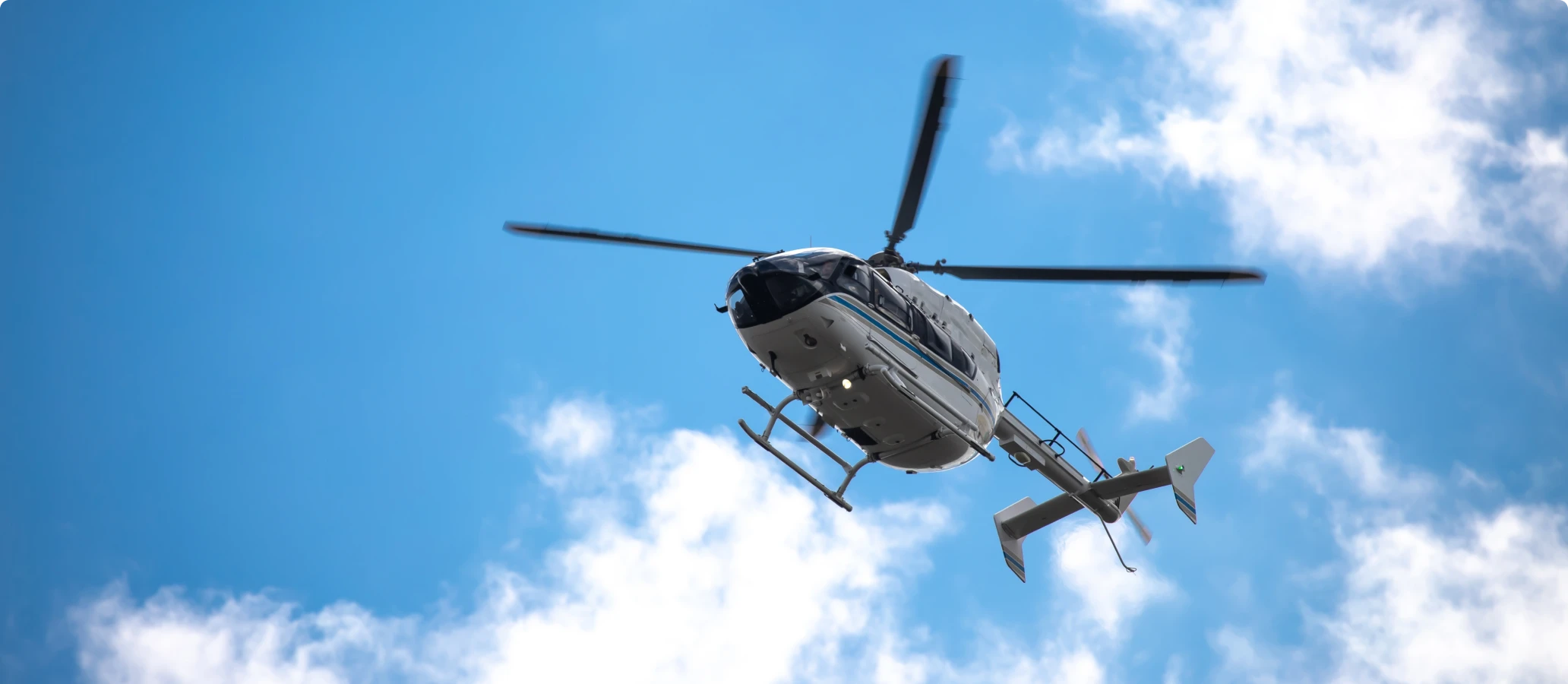When you become a passenger on a helicopter, you might assume they have the same safety and industry standards as commercial airlines. Unfortunately, this is not the case. Privately-owned and chartered aircrafts – such as those manufactured by Bell Helicopters – are often more susceptible to a crash.
Wisner Baum is a recognized leader in complex litigation involving plane accidents, helicopter crashes and other air disasters in the U.S. and worldwide. The firm’s experienced helicopter attorneys have represented victims in medical helicopter air‑ambulance rescue operations and work‑related helicopter accidents, including industrial and construction type operations as well as professional aerial photography and logging enterprises.
Ready to speak with a Bell Helicopter crash attorney? Contact Wisner Baum at (310) 207-3233 or submit a form online.
Bell Helicopter Company Overview
Bell Helicopter Textron, Inc., began in 1935 as Bell Aircraft Corporation. The company has produced more than 35,000 aircraft and serves customers around the world. The company is headquartered in Fort Worth, Texas, and has manufacturing plants in Amarillo, Texas, and Mirabel, Canada.
The company claims the invention of the tilt rotor aircraft, which purports to produce vertical lift like a helicopter for takeoff and landing, then shifts (tilts) to horizontal thrust in order to achieve speeds similar to an airplane. It boasts the ability to carry three times more cargo than traditional helicopters.
Bell Helicopter Accidents and Incidents Handled by Wisner Baum
Bell helicopters have been involved in approximately 4,900 accidents, 800 of which were fatal crashes. As a result, more than 1,660 people have died. Wisner Baum has handled some of the worst aviation disasters in history, including several helicopter cases involving Bell helicopters.
The following are some of the Bell helicopter accidents we have handled, all of which have been resolved with our clients’ approval:
- December 10, 2015, near McFarland, California, crash of a Bell 407 medical helicopter, operated by Rogers Helicopters, dba SkyLife.
- September 19, 2011, Camp Pendleton, San Diego, California, Bell AH-1W Cobra Attack helicopter training flight crash.
- July 23, 2003, Kauai, Hawaii, sightseeing flight to Waialeale Crater, operated by Jack Harter Helicopters, Inc., involving a Bell 206B JetRanger helicopter (four passengers and one crew member killed).
- November 1, 1999, Cottage Grove, Minnesota, accident involving a Bell 206B JetRanger helicopter that crashed on its way to provide aerial shots for ABC’s Monday Night Football (one passenger and the pilot, working for KSTP TV, were killed).
- March 23, 1998, Los Angeles, California, an air ambulance flight involving a Bell 205A1 Medical Helicopter operated by the Los Angeles Fire Dept., crashed in Griffith Park, (four passengers killed, two seriously injured).
- November 29, 1996, a Bell 206B JetRanger operated by Pacific Helicopter Tours, Inc., of Kahului, Hawaii, was substantially damaged near McGregor Point, Maui, Hawaii, during a power line construction project (pilot and his passenger both received serious injuries).
- September 2, 1992, a Bell 206L3 LongRanger medical helicopter from San Juan Medical Center in Farmington, New Mexico, leased by the hospital from Air Methods Corp. crashed northeast of Durango, Colorado while attempting to rescue a hiker who had suffered a stroke (three people were seriously injured).
- July 22, 1991, a Bell 206B JetRanger, operated by Intermountain Air Service, was on a scenic sightseeing tour of Mt. St. Helens when the aircraft turned to view a herd of elk in a dry river bed and crashed. (We represented two passengers injured in that accident.)
- June 22, 1976, a Hanson Aviation, Inc., chartered Bell 206B JetRanger helicopter, carrying film producers and photographers scouting locations for a Kodak commercial, crashed and burned near Bishop, California. Two people were seriously injured and two were killed. (Ron Goldman tried this case before joining Wisner Baum, obtaining a plaintiffs jury verdict in Gradus vs. Hanson Aviation, Inc., 1984)
Why Choose Wisner Baum for Your Bell Helicopter Lawsuit
Victims and their families deserve more than just legal representation—they deserve fierce advocates who understand the complex technical, regulatory, and corporate dynamics that contribute to helicopter disasters. At Wisner Baum, our Bell Helicopter attorneys combine decades of experience with the resources necessary to take on major corporations and hold them accountable for incidents that could have been prevented.
Our commitment to helicopter crash victims includes:
- Comprehensive investigation using leading aviation experts and accident reconstruction specialists.
- In-depth analysis of maintenance records, pilot training, and mechanical defects.
- Aggressive pursuit of all liable parties, including manufacturers, maintenance providers, and operators.
- If we don’t win compensation on your behalf, you owe us nothing.
Whatever your case involves, our legal team will work tirelessly to build a compelling case to hold all responsible parties accountable and obtain maximum compensation.
Time is critical in aviation accident cases. Evidence can become hard to find, witnesses' memories fade, and crucial flight data may be lost or compromised. If you or someone in your family were harmed in a Bell Helicopter crash, contact Wisner Baum immediately for a free, confidential consultation.
Call (310) 207-3233 or submit our online form to speak with a Bell Helicopter accident attorney today. Your consultation is free, and we can answer any questions you may have about your claim.


